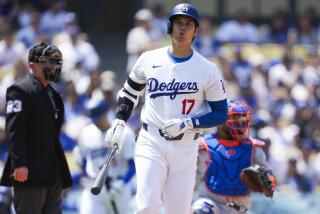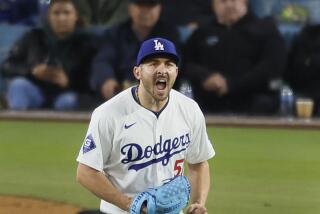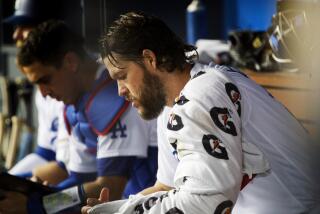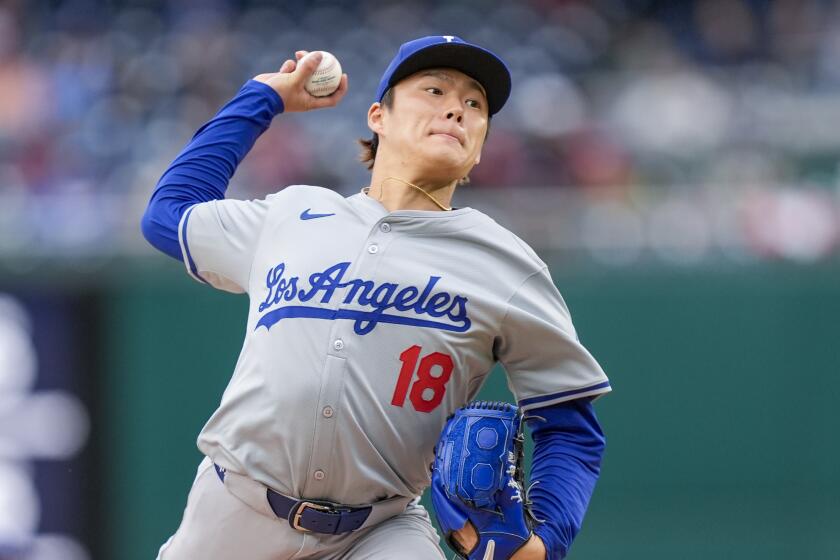Dodgers vs. Brewers may come down to starters vs. relievers
The math never changes. A baseball series can be considered a test of wills, a contrast of styles or a clash of potential champions. But the math is iron-clad, which is why starting pitchers still carry weight, Dodgers general manager Farhan Zaidi explained.
“In every playoff game, 27 outs feels like a lot,” Zaidi said. “When you’ve got to do that seven times in nine days, as opposed to five times in seven days, getting those outs in bigger bunches matters.”
“It’s weird,” he added. “You usually talk about shortening the game for the starter. But nowadays, it’s almost about shortening the game for the bullpen — making them get six to nine outs, instead of 12 to 15 outs.”
When Game 1 of the National League Championship Game begins Friday night, the players swaddled from the Wisconsin chill underneath the dome of Miller Park, the Dodgers and the Brewers probably will follow different formulas in search of 27 outs.
The most intriguing aspect of this season’s NLCS might be this: The Dodgers — the team with laser-guided outfield positioning, endless platoon machinations and in-game decision trees — will be the conventionalists. It will be the Brewers who defy the customary standards of bullpen usage in pursuit of a title.
After riding their bullpen hard to the World Series in 2017, the Dodgers received a receipt for the usage when Houston hammered their relief corps. With their bullpen less reliable this season, and with their starters primed to last deeper into games, the team has switched up its strategy — just in time to face a team who leans even harder on their relievers than the Dodgers did. The strength of Milwaukee’s pitching staff resides in their relief trio of Josh Hader, Jeremy Jeffress and Corey Knebel.
A sliver of the dichotomy was apparent Thursday, as the teams worked out here. Dodgers manager Dave Roberts announced Clayton Kershaw as their Game 1 starter, followed by Hyun-Jin Ryu in Game 2, Walker Buehler in Game 3 and Rich Hill in Game 4. The quartet pitched with a combined 2.82 ERA during the regular season, and kept the group afloat while the bullpen malfunctioned and the lineup snoozed.
Milwaukee countered by listing only two starting pitchers, a pair of left-handers: Gio Gonzalez for Game 1 and Wade Miley for Game 2. They kept the rest of their plans under wraps. One reason for the subterfuge: Their potential Game 3 starter, Jhoulys Chacin, might pitch as a reliever in Game 1.
“Look,” Brewers manager Craig Counsell said Thursday afternoon, “it’s no secret that we’re going to use our pitching a little differently than the traditionalists would like.”
The Brewers’ bullpen carried the team to its first division title since 2011. Milwaukee finished second in the National League in relief innings, second in bullpen ERA and first in strikeouts per nine innings from relievers. Hader led the sport by striking out 46.7% of the batters he faced, and Knebel ranked fifth with 39.5%.
Jeffress whiffed 29.8% of his opponents — a more prosaic number that still ranked 31st among qualified relievers — but posted a team-best 1.29 ERA. He does not profile as a closer in the classical sense, though the Brewers used him in the ninth inning of all three victories over the Colorado Rockies. Jeffress blew a save in Game 1. Hader replaced Jeffress with one out in the final inning of Game 3 after Jeffress gave up a hit and a walk.
The Brewers used a reliever, Brandon Woodruff, to begin Game 1. After the victory, Counsell praised his team for the fluidity of its pitchers.
“We’re trying to get away from what the word ‘starter’ and ‘reliever’ means,” Counsell said. “That’s how we’re going to get through the postseason.”
The Tampa Bay Rays resorted to the concept of “bullpenning” this summer, and the Oakland Athletics were adherents soon after. The idea backfired for Oakland in the American League wild-card game, when opener Liam Hendricks gave up a first-inning homer and closer Blake Treinin foundered in the middle innings.
The Braves implemented a similar strategy in Game 3 of the NLDS, with left-hander Sean Newcomb followed by right-hander Kevin Gausman. The Dodgers scored five runs but lost. Milwaukee may traverse a tightrope like those teams, only with more talented walkers.
“We know we’ve got a lot of guys,” Counsell said. “The depth of our staff is what is the most meaningful thing for me when we figure out how we do this. We like the depth of our staff, and we think Gio is the perfect option to start us out.”
Acquired at the end of August from Washington, Gonzalez called his team’s bullpen “phenomenal” and insisted “it’s pretty cool what’s going on.”
Kershaw was diplomatic when asked about bullpenning. He called himself a “traditionalist” about starting pitching, but conceded the radical strategy has value.
“It’s not really sustainable for a full season,” Kershaw said. “But it definitely makes sense for a postseason.”
The Dodgers opted for a different approach against Atlanta. Ryu threw seven scoreless innings in Game 1 and Kershaw followed with eight scoreless in Game 2. The starters kept Atlanta from getting many looks at the team’s bullpen, which is still in search of a discernible hierarchy.
The Dodgers threw 35 innings against Atlanta, and starters accounted for 24 1/3 of those. In contrast, in the Brewers’ 28 innings against Colorado, the bullpen soaked up the majority, 15 2/3 innings, en route to a sweep.
Roberts and his players acknowledged the inherent challenge of facing an elite bullpen. But they insisted their approach would not change. They want to get the opposing starter out of that game — even if that’s what their opponent wants to happen.
“Regardless of how good a ‘pen is, the more innings you can have them log, I think that’s in our best interest,” Roberts said. “So the idea of beating the starter, for me, still makes sense.”
Twitter: @McCulloughTimes
More to Read
Are you a true-blue fan?
Get our Dodgers Dugout newsletter for insights, news and much more.
You may occasionally receive promotional content from the Los Angeles Times.







